- Home
- Suzanne Selfors
Smells Like Pirates Page 22
Smells Like Pirates Read online
Page 22
Everyone but Homer and Dog said, “Aye.”
“All those opposed?” Hercules waited. Then he burst into a smile. “The motion is carried. Homer Winslow Pudding is elected by majority vote to be the next president of L.O.S.T.”
Homer didn’t know what to say. He felt kinda giddy, as if he’d eaten too much sugar. Dog had definitely eaten too much sugar because he was walking in a circle for no apparent reason.
“So, Mr. President, what will your first agenda item be?” Ajitabh asked with a wink.
Homer didn’t need any time to think about his answer. He’d been trying to figure out a way to bring this up since the moment he returned to the Mockingbird Hotel. “I think we should let Lorelei join.” He scooted to the edge of his chair and took a long breath. Then, as he spoke, he looked each member in the eyes so they’d understand that he was dead serious. “I know she’s made lots of mistakes, but she’s a great treasure hunter. She’s one of the best. Without her, we wouldn’t have Rumpold’s treasure. She made a gentleman’s agreement to never tell the world about L.O.S.T., and I believe she will keep her word. I think she’d make a good new member.”
“Now that we’ve lost Torch and Gertrude, I’m the only female at the meetings,” Zelda said. She pushed a silver lock from her eyes. “That doesn’t seem fair. Even Dog is male.” Dog stopped turning in circles, wobbled a bit, then lay on his belly and groaned. Was he overfed or simply bored? L.O.S.T. meetings aren’t as exciting for dogs as they are for people.
And so, another vote was taken, and it was agreed that if Lorelei accepted, she’d be given membership.
“Oh, she’ll accept,” Homer said with utmost certainty. “She’ll accept.”
Angus grabbed his plaid suitcase and telescope. “Dinna anyone try tae follow me. Ah’m going north tae find mysel’ a nice wee cave and a nice bright sky.” And with that, after a quick pat to Dog’s head, he hurried from the room.
“Thanks for your help,” Homer called after him.
Zelda filled everyone’s teacups, even Dog’s. “Let us raise our glasses and welcome our new president,” she said.
“Here, here,” everyone said.
As teacups clinked, Dog pawed at Homer’s leg, then rolled over and stuck his own stubby legs in the air. Homer slid to the carpet. After all, just because he was the president of a secret organization didn’t make him too important to scratch his best friend’s belly.
“We’ll share the job,” he whispered in Dog’s soft ear.
“Urrrr.”
Because the Pudding driveway was blocked by an enormous inflatable bouncy castle, the limousine stopped next to the mailbox. The engine idled as the driver waited for good-byes to be said. Homer didn’t like good-byes. In the treasure-hunting business, you never know when a good-bye might be permanent.
“When will I see you again?” Homer asked.
Ajitabh smiled, though no twinkle lit in his eyes. “Only time knows the answer.” He reached into his pocket and pulled out a key. Then he attached it to the chain that hung around Homer’s neck, right next to his membership coin. “This key will open the L.O.S.T. safe-deposit box. You are the sole owner. Keep it close at all times.”
Homer gripped the chain. “I’ll never take this off. Not even when I’m in the shower.”
Ajitabh set his hand on Homer’s shoulder. “When I first saw you, I wasn’t convinced you’d be able to follow in your uncle’s footsteps. You didn’t look like a treasure hunter.”
“That’s because when you first saw me you were hanging upside down from your cloudcopter,” Homer said, remembering that spring day in the orchard. “Everyone looks weird upside down.”
“Quite right,” Ajitabh said. The familiar twinkle appeared in his eyes, like a star waking in the night sky. “If Drake were here, he’d burst with pride. You’ve done him credit and more. Perhaps I should keep calling you Mr. President.”
Was he joking? Homer cringed. “That sounds strange. Please don’t call me that. I’m still Homer.”
Ajitabh chuckled. Then he rapped on the glass partition. The driver walked around and opened the passenger door. Ajitabh stepped out, followed by Homer and Dog. “Your uncle used to talk about how much he missed country air—the scent of grass and goats, the fresh breeze.” He inhaled. “I think it’s even nicer than the scent of cloud cover.”
Homer took his own deep breath. The air filled his lungs in a refreshing way, cleaning out the last remnants of The City.
Ajitabh reached down and patted Dog’s head. Then he ducked back into the limousine. “Enjoy the rest of the summer,” he said. “School will be starting soon enough.”
“When will we—?”
“All in good time,” Ajitabh interrupted. “All in good time.” The driver closed the door, then settled into the driver’s seat. Ajitabh’s window rolled down just enough for his voice to escape. “Cheerio, Mr. President.” The limousine pulled away and headed back down Grinning Goat Road. Homer watched until the license plate, MBIRD18, disappeared from view.
He sighed. All in good time. What kind of answer was that? A week? A month? Twenty years? Maybe it wouldn’t be too long. One thing he’d learned about this whole treasure-hunting thing—it always popped up when he least expected it.
Homer had spent one last night at the Mockingbird Hotel. He collapsed right after the election meeting and didn’t stir until morning, enjoying the deep sleep of victory. And now he and Dog were back home.
A pink balloon floated past, as did a stray streamer. The farm dogs, Max, Gus, and Lulu, bounded down the driveway, their shiny coats rippling with their graceful steps. They sniffed Homer’s legs and Dog’s rump, then circled as herding dogs do. “Hey, there,” Homer said, giving each a long pet.
The goats stuck their noses between fence boards, ever curious about the happenings on the other side. Homer stopped and scratched a few noses. One goat nibbled on his shirtsleeve; another bit off a piece of shoelace. The rest stared at him with inquiring eyes. “I’ll tell you all about it later,” he told them. Goats are the snoopiest of farm animals. The chickens, on the other hand, couldn’t have cared less about where Homer had been or what he’d been up to. They scratched at the dirt, searching for potato bugs and worms.
When Homer and Dog reached the top of the driveway, the bouncy castle was tipping from side to side. “Hello?” Homer called.
“Hi, Homer!” Squeak slid out and landed on the gravel, his cheeks bright red, his hair matted with sweat. “I’ve been bouncing all day. It’s really fun. I threw up two pieces of birthday cake!” Dog licked Squeak’s face, then farted when Squeak squeezed him around the middle.
“Where is everyone?” Homer asked.
“The party’s over. All the girls went home.” Squeak scrambled to his feet. “I’m going to bounce some more. Want to bounce with me?”
“Sure, but first I’m going to tell Mom and Dad I’m home.”
“Okay.” Squeak climbed up the inflated drawbridge. “Whoopee!” he cried as the castle tipped from side to side.
The picnic table was covered with a pink tablecloth. Bouquets of pink balloons floated above the porch railing. Plastic spoons and cups lay strewn about the yard, along with paper crowns. Gwendolyn sat alone at the table, slumped in a chair that had been decorated to look like a throne. “Hi,” Homer said.
She glared at him from beneath her brown bangs. Piles of crumpled wrapping paper circled her throne. A paper crown hung off the side of her head. “You missed it,” she grumbled, her arms tightly folded.
“Sorry,” he said. “Did mom give you a… a princess party?”
“Can you believe it?” Gwendolyn slumped lower. “She thinks I’m still eight years old. I wanted a roadkill theme and she chose princess.”
Homer sat on the bench next to his sister. A ring of pink frosting and sprinkles was all that remained of the birthday cake. He ran his finger through and tasted strawberry. It was pretty good, but Gwendolyn wasn’t a strawberry-flavored, princess-themed kind of gi
rl. “Where’s Mom and Dad?”
“Mom said she needed a nap, and Dad is driving my friends home.”
Homer pulled wrapping paper from Dog’s mouth. “I’m sorry I missed your party.” Then he reached into his backpack. “I got you something.” He pushed aside some paper plates, then set a small bundle on the table. He’d used the Jolly Roger flag to conceal the present.
The crown tumbled off Gwendolyn’s head as she sat upright. “You got me something?” She carefully unfolded the flag and gasped. “What is it?”
“It’s a vampire squid. It’s really old.” Homer waited for her reaction.
She scrunched up her face and poked at the little dried creature. “Vampire?”
“You said you wanted roadkill.” Homer shrugged. “It isn’t technically roadkill. It was killed by a pirate, so I guess it’s pirate-kill. Does that count?”
“Cool.” Gwendolyn pinched the creature between her fingers and held it up for inspection. A huge grin broke across her face. “Really cool. This is the best present ever.” And then she did something she hadn’t done for a very long time. She hugged her brother. “Thank you.”
“You’re welcome. Thanks for doing my chores while I was gone.” He hoped she’d tell him that he didn’t have to do her chores for one month, as he’d promised, but she didn’t. Oh well. That was Gwendolyn.
She grabbed her lab coat off the back of the throne. As she buttoned it over her party dress, she looked sheepishly at Homer. “Uh, I did something that maybe I shouldn’t have done.” She flipped her braids behind her shoulders. “I gave one of your weird books to a girl with pink hair. It was a book about reptiles, and it was under your bed with all your other weird stuff. You’re not mad, are you? It didn’t look like an important book.”
“I’m not mad,” Homer said, holding back a smile. If you hadn’t given her the book, he thought, then Rumpold’s treasure might still be at the bottom of the sea.
“Okay, then. No harm done.” Gwendolyn grabbed the vampire squid and hurried off to her laboratory. “Thanks again!” she called before disappearing inside.
Homer sat at the picnic table amid the remains of the princess party. He gazed around. A few months ago, this had been his whole world—the rolling green hills, the barn with the sagging roof, the goats, chickens, and farm dogs. But now he’d traveled across the sky and beneath the ocean. He’d amassed secrets and treasures with more waiting to be found. The future was brighter than ever for this farm boy.
“Urrrr.”
And the future was brighter than ever for this basset hound.
Homer knelt on the ground and pulled another piece of wrapping paper from Dog’s mouth. “Come on. Let’s go inside and get you some real food.” Dog wagged his tail.
Homer took another long breath. Ajitabh and Uncle Drake were right. There was something special about country air. The sweet notes of mowed grass, the earthiness of dirt, the tanginess of buttercups warmed by the sun. He buried his face in Dog’s fur. And the sour and saltiness of basset hound.
In other words, the beautiful scents of home.
No one seemed happy to see her. The prison didn’t hold a welcome-back party or anything like that. They just gave her a new pair of pajamas and showed her to the old cell she’d had before.
“You’re going to be in here a long time,” the warden said with smug satisfaction. And then he attached a chain around her ankles so she couldn’t run, couldn’t climb, couldn’t escape. “A very long time.”
She wasn’t allowed to work in the prison kitchen. She wasn’t allowed in the exercise yard or the TV room. The only room she could enter was the visiting room, but who would come to see her? She’d made plenty of enemies on the outside, but no friends.
That’s why it was most surprising that on the sixteenth day of her incarceration, someone came calling.
Prisoner #90 sat in the chair, tapping her slippered feet. Who had the nerve to keep her waiting? Didn’t anyone have any respect? She was and would always be Madame la Directeur.
She leaned forward, peering through the thick glass window, as the door on the other side opened. An old woman shuffled through. Her stained gray dress and white apron flapped against her shins; her rubber boots squeaked along the concrete floor. She adjusted her plastic shower cap, then sat.
A sour taste filled Madame’s mouth. “Come to gloat?”
The Unpolluter said nothing. She scratched her blueberry-sized mole.
“Or maybe you wanted to make sure I was comfortable,” Madame said sarcastically. “Maybe you were worried about me.”
The Unpolluter’s voice drifted through the speaker. “I came to tell you about the kids.”
“The kids?” Madame snorted. “Why would I care about the kids? I despise both of them, and I wish they’d never been born!”
“I thought you might like to know that Homer W. Pudding is the new president of L.O.S.T.” A smile, ever so slight, formed on the old woman’s lips. “I thought you might like to celebrate his good fortune.”
Madame’s body temperature rose five degrees, turning her face and neck crimson red. Hot breath shot from her nostrils, as if she were part dragon. “President?” she hissed. “President?” She shot to her feet. The ankle chain tightened as she lunged at the glass partition.
“Sit down,” the guard hollered.
Madame’s body shook with fury as she lowered herself back onto the chair. “President,” she whispered. “A twelve-year-old boy will lead L.O.S.T. What is the world coming to?”
“That’s not all,” The Unpolluter said cheerfully. “There’s something about the girl I thought you should know.”
“That girl is a menace. I took her off the street, gave her a job, and she turned against me. She stole my…” Madame hesitated.
“She stole your lair,” The Unpolluter said. Madame’s eyebrows darted upward. “Don’t be so surprised. Of course I know about the lair. It’s my job to keep my eyes open. Besides, I’ve been watching over the girl ever since she was left at the orphanage.”
“What do you mean, watching over her?” Madame asked. “You’ve been protecting her?”
“No, not protecting. My job is to protect L.O.S.T. The girl needs no protection. She has to be strong and make her own way. I’ve simply been keeping track of her.”
“Why would you do that? She’s a street urchin, nothing more.”
“But she is more. Much more.” The Unpolluter stood. She pulled up her kneesocks and smoothed out her apron. “I’m so happy I didn’t have to get rid of her. I’m so happy she’ll be joining L.O.S.T. The organization could use her talents. Her blood runs true.”
Once again, Madame’s face burst with color. She took a ragged breath. “Her… blood?”
“Yes, her blood.” The Unpolluter headed toward the exit but turned just long enough to deliver the information she’d come to deliver. The thing that would haunt Madame la Directeur for the rest of her days.
“Lorelei’s last name is Smeller.”
Madame clenched her hands in her lap and tried, with all her might, to control the surprise that hit her like a piano dropped right onto her head. The pink-haired street urchin was a Smeller.
“A Pudding and a Smeller working together. Imagine that,” The Unpolluter said with a smile. “There’s no telling what amazing things those two will accomplish.” Then, with a little wave, she left.
The visiting room door closed with a thud.
Prisoner #90’s scream echoed throughout Soupwater Prison.
Dear Reader,
Because Drake H. Pudding was a very important part of Homer’s life, and because his advice was more valuable to Homer than any material treasure, I’ve decided to include some of his quaint sayings in this addendum. Feel free to quote him. It will make you sound wise beyond your years.
“It is a sad truth of human history that those who dare to be different are often judged to be not quite right in the head.”
“Only the curious have something to find.”
“A treasure hunter must always cover his tracks and night provides the best cover of all.”
“Solitude is the treasure hunter’s destiny…. You will face the final test of endurance and intellect on your own.”
“All that sparkles is not splendid.”
“Sometimes a map doesn’t take you where you want to go.”
“Never ignore lunch or a hunch. One can fuel the body while the other can fuel a discovery.”
“If we had one-tenth of an ant’s determination, we could do anything. With determination, anything is possible.”
I’ve written quite a few books thus far, and what I’ve learned is this: Writing can be gosh-darn lonely, and unless you want to be like Angus MacDoodle and live like a hermit, you must close the laptop and go out into the world for guidance and the occasional pat on the back.
For many pats on the back, I offer my thanks to my family—Isabelle, Walker, and Bob.
For priceless guidance, for reading my first drafts, and for helping me through my competing bouts of self-doubt and delusions of grandeur, I offer my thanks to Carol Cassella, Claire Dederer, Elsa Watson, and the newest editor on the team, Pam Garfinkel. Christine Ma copyedited the manuscript, and she’s the best copy editor I’ve ever worked with! Thank you, Christine.
I couldn’t have translated the Latin without Elsa Watson, Susan Fidelman, and Anna Backer. As for the Scottish lilt, I relied on Margaret Trent, who hails from that glorious country. Thank you, thank you!
Michael Bourret and Julie Scheina, well, really, do I need to keep thanking you in every single book I write? For Pete’s sake, don’t you know by now that I think you’re both wonderful?
To my readers, thank you for continuing this adventure with me. Without you, I would be all alone in my imaginary worlds. I love getting your letters, and I hope you’ll keep visiting me at www.suzanneselfors.com.

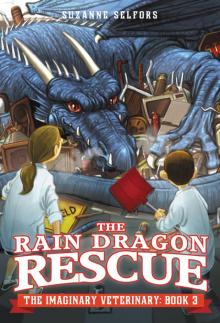 The Rain Dragon Rescue
The Rain Dragon Rescue Ginger Breadhouse and the Candy Fish Wish
Ginger Breadhouse and the Candy Fish Wish Ever After High: Lizzie Hearts and the Hedgehog’s Hexcellent Adventure: A Little Shuffle Story
Ever After High: Lizzie Hearts and the Hedgehog’s Hexcellent Adventure: A Little Shuffle Story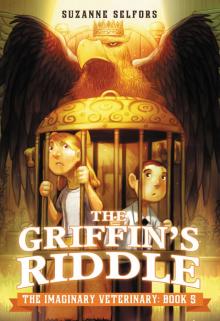 The Griffin's Riddle
The Griffin's Riddle Smells Like Pirates
Smells Like Pirates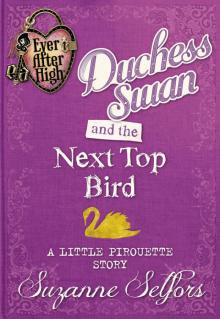 Duchess Swan and the Next Top Bird
Duchess Swan and the Next Top Bird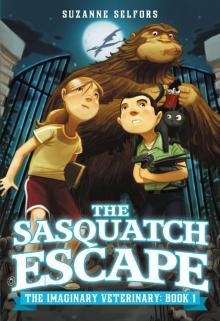 The Sasquatch Escape
The Sasquatch Escape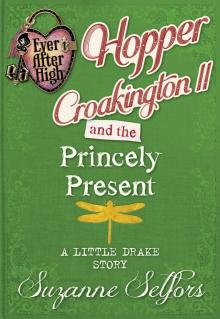 Hopper Croakington II and the Princely Present
Hopper Croakington II and the Princely Present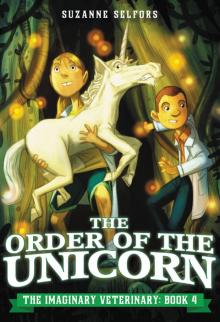 The Order of the Unicorn
The Order of the Unicorn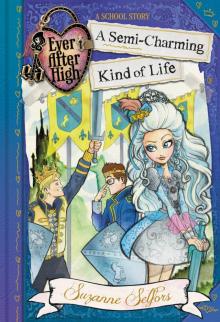 A Semi-Charming Kind of Life
A Semi-Charming Kind of Life Braver
Braver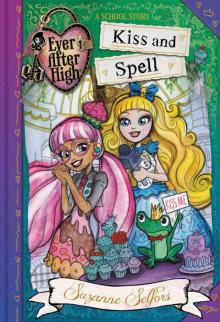 Kiss and Spell
Kiss and Spell Wedgie & Gizmo
Wedgie & Gizmo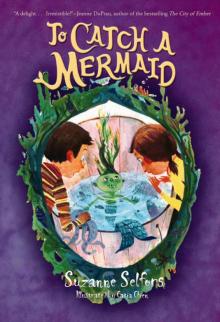 To Catch a Mermaid
To Catch a Mermaid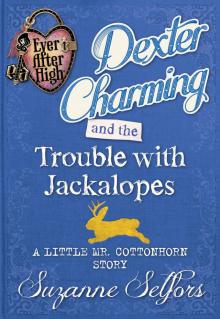 Dexter Charming and the Trouble with Jackalopes
Dexter Charming and the Trouble with Jackalopes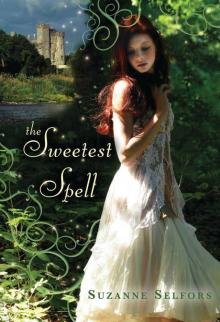 The Sweetest Spell
The Sweetest Spell CoffeeHouse Angel
CoffeeHouse Angel Wish Upon a Sleepover
Wish Upon a Sleepover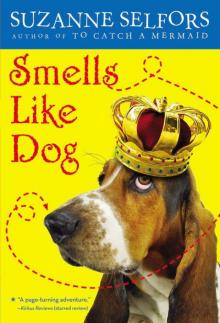 Smells Like Dog
Smells Like Dog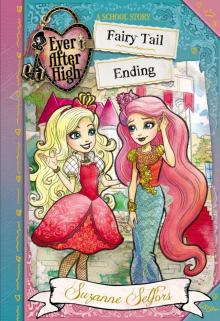 Ever After High
Ever After High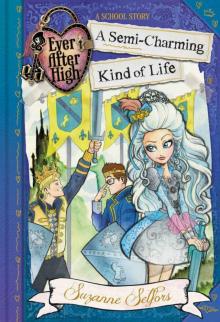 Ever After High: A Semi-Charming Kind of Life
Ever After High: A Semi-Charming Kind of Life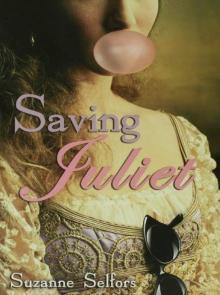 Saving Juliet
Saving Juliet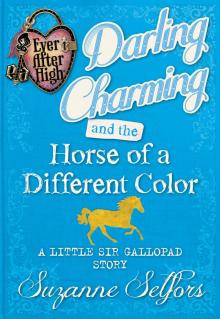 Darling Charming and the Horse of a Different Color
Darling Charming and the Horse of a Different Color Wedgie & Gizmo vs. the Toof
Wedgie & Gizmo vs. the Toof Spirit Riding Free--The Adventure Begins
Spirit Riding Free--The Adventure Begins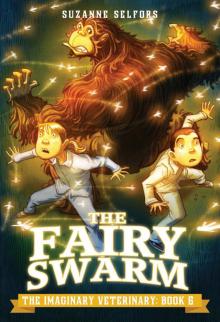 The Fairy Swarm
The Fairy Swarm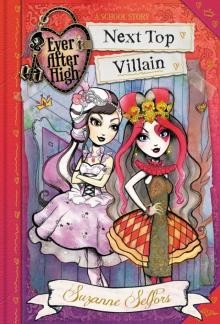 Ever After High: Next Top Villain: A School Story
Ever After High: Next Top Villain: A School Story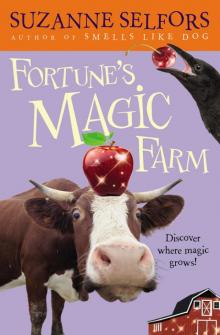 Fortune's Magic Farm
Fortune's Magic Farm The Lonely Lake Monster
The Lonely Lake Monster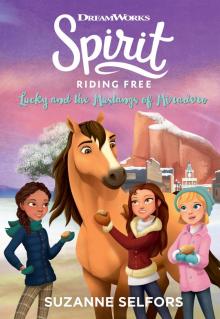 Spirit Riding Free--Lucky and the Mustangs of Miradero
Spirit Riding Free--Lucky and the Mustangs of Miradero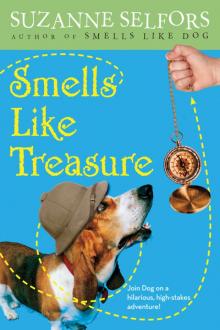 Smells Like Treasure
Smells Like Treasure Mad Love
Mad Love